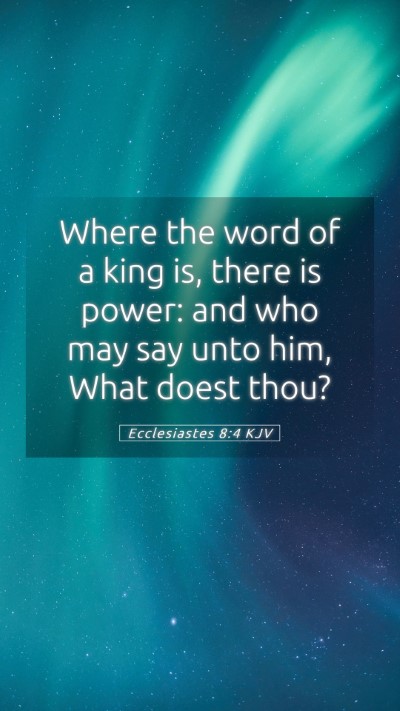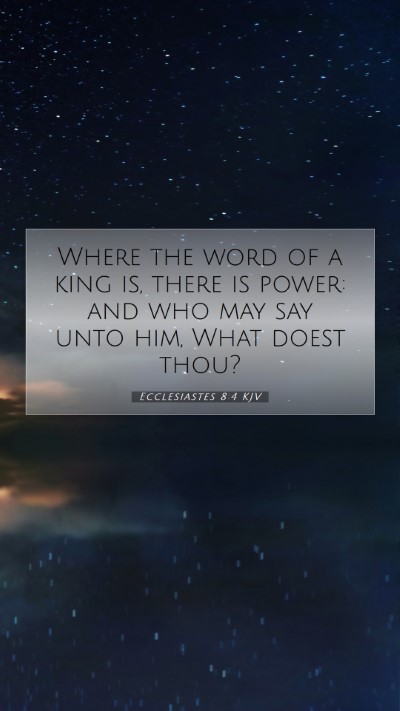Understanding Ecclesiastes 8:4
Bible Verse: Ecclesiastes 8:4 - "Where the word of a king is, there is power: and who may say unto him, What doest thou?"
Overview
In Ecclesiastes 8:4, the author reflects on the authority and power that comes from the word of a king. This verse can lead to various bible verse explanations and interpretations that explore the roles of authority, governance, and wisdom.
Bible Verse Interpretations
- Authority of a King: The verse emphasizes the influence and strength behind a king’s word, suggesting that such authority is unquestionable and carries a significant weight (Albert Barnes).
- Power of Speech: The phrase illustrates how words can wield great power and impact, highlighting the importance of communication in leadership (Adam Clarke).
- Human Limitations: The rhetorical question “What doest thou?” points to human limitations in questioning authority, reflecting the futility of challenging those in power (Matthew Henry).
Scripture Analysis
This verse serves as a commentary on the dynamics of power within governance and the implications for individuals subject to authority. The king’s word is a metaphor for ultimate authority, encouraging readers to consider the nature of power in human relationships.
Biblical Exegesis
From a biblical exegesis perspective, Ecclesiastes is often viewed as a reflection on the vanity of life and the quest for meaning. In this context, chapter 8 contrasts the futility of earthly pursuits with the unavoidable reality of death and the mysteries of divine providence.
Insights from Commentators
- Matthew Henry: Stresses the necessity of wisdom in dealing with worldly power, noting that wisdom can help one navigate the challenging dynamics of authority.
- Albert Barnes: Highlights the significance of respecting authority and recognizing its capabilities, warning of the challenges involved in defying rulers.
- Adam Clarke: Provides insight into the nature of kingship, explaining that a king's decrees must be obeyed, aligning with the broader themes in the Book of Ecclesiastes.
Application of the Verse
This verse invites readers to reflect on the nature of authority in their own lives. Applying Bible verses to daily life often involves recognizing that while earthly leaders may have power, it is essential to discern the moral implications behind their words and actions.
Bible Study Insights
- This verse can serve as a discussion point in bible study groups, encouraging participants to explore the balance between authority and moral responsibility.
- Engaging with this verse can help one understand the historical context of governance in biblical times, offering deeper bible study insights.
Cross References
- Proverbs 20:2: "The fear of a king is as the roaring of a lion: whosoever provoketh him to anger sinneth against his own soul."
- Romans 13:1: "Let every soul be subject unto the higher powers. For there is no power but of God: the powers that be are ordained of God."
- Ecclesiastes 5:8: "If thou seest the oppression of the poor, and violent perverting of justice and righteousness in a province, marvel not at the matter: for he that is higher than the highest regardeth; and there be higher than they."
Conclusion
Ecclesiastes 8:4 invites readers into a deeper understanding of the complexities of authority and the human experience. By utilizing tools such as bible study resources and engaging in in-depth Bible verse analysis, one can uncover layers of meaning in scripture that resonate with contemporary life, encouraging a thoughtful approach to applying biblical wisdom daily.


